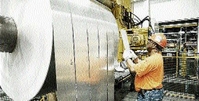
Finished rolls of aluminium come off the last stage of the production line at the Alcoa Warrick Operations plant in Indiana, on April 7, 2006. - File
Oleg Deripaska, chief executive officer and majority shareholder of UC Rusal, the world's largest alu-minium producer, has spoken publicly of discussions currently taking place with governments on measures to reduce the global capacity of aluminium.
The comments have got very little attention, though he first made them more than a month ago at the annual meeting of the World Economic Forum held in Davos, Switzerland.
Deripaska's comments represent the first official confirmation of rumours that have been circulating for months that there might be a revival of the 1994 Memorandum of Understanding (MOU) of alu-minium, according to a Reuters report.
"We welcome now the starting discussions with governments which are now taking place," said Deripaska back in February. "As we understand, after the discussions we could see a memorandum which we saw at the beginning of the 1990s when the governments took certain measures to promote reducing capacity."
He further suggested that if such an agreement could be reached, it would stabilise the market "for the interest of both producers and consumers".
The 1994 MOU was an inter-governmental agreement signed by Australia, Canada, the European Union, Russia and the United States that allowed the major aluminium producers to simultaneously cuts in aluminium production in response to the significant build-up to historical levels of stocks of surplus metal.
The signatories represented the major aluminium-producing nations at that time. China was still a relatively minor player as it had not yet embarked on its phenomenal capacity expansion.
At the time, the agreement was seen as a one-off exceptional develop-ment, as a response to the massive reduction in the demand for aluminium from the fall-off in production of the Soviet arms industry that followed the collapse of the Soviet Union.
Real trigger
Until then, the arms industry was the major customer of Russian aluminium. Russian producers then flooded the global aluminium market, acting as the real trigger for the MOU.
The agreement was hammered out behind closed doors at the European Commission in Brussels, and only Russia committed to an actual quota in which it agreed to cut back production by 500,000 tonnes per annum.
The other signatories did not agree to any specific quotas, nor was there any enforcing mechanism to the agreement. They merely "considered that the principle response to this situation should be by way of worldwide market-oriented commercial decisions by companies on an individual basis."
Subsequent to its signing by governments, most of the major aluminium producers made similar "commercial" decisions and, one after the other, announced a series of production cuts.
Record stockpiles
Once again stockpiles of alumina and aluminium have reached record levels, and if as Deripaska suggests, global demand as a result of the current world economic crisis is set to decrease substantially, then prices will not recover any time soon.
The current price on the LME for aluminium is approximately US$1,600 per tonne, down from the historical high of US$3,380 last July.
But as some analysts point out, this time the build-up to the current scenario is somewhat different, as the industry has only itself to blame for the worldwide stockpile of aluminium.
This time around there was no break-up of a major superpower, rather as Reuters points out the situation is due to "a collapse of the credit markets that allowed surplus capacity to produce surplus metal to be sold to intermediaries to hold in off-market stocks.
It has been the movement of this previously hidden surplus to visible LME warehouses that has propelled exchange inventories so high and so fast."
It will be interesting to see if an aluminium MOU II makes the agenda of the G-20 summit in London.
renee.shirley@yahoo.com